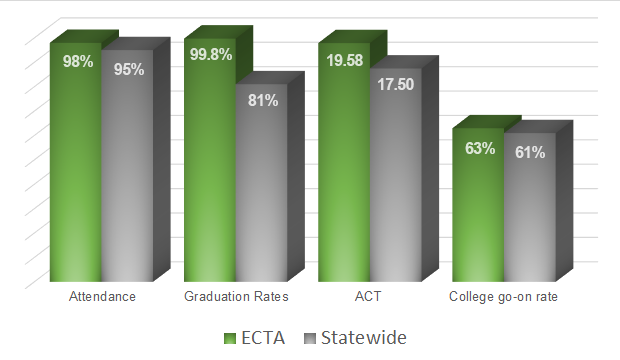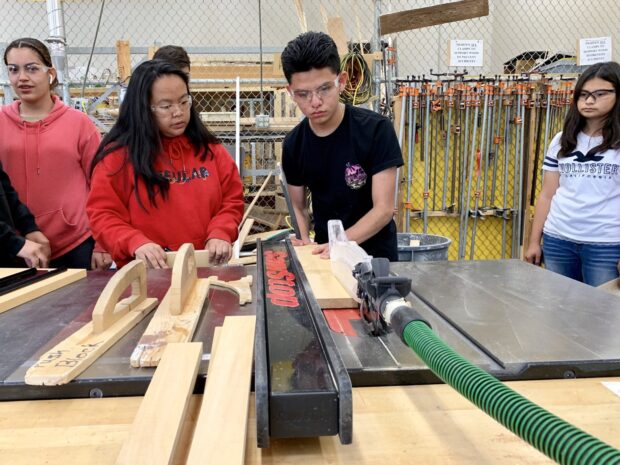This is one of four stories featuring what some of the nation’s top-performing high-poverty schools are doing to boost achievement among students in poverty.
LAS VEGAS, Nev. — Darlin Delgado’s past inspires her pursuit to help students in poverty.
“I was one of them,” said Delgado, principal at Las Vegas-based East Career and Technical Academy.
Delgado’s family migrated from war-stricken El Salvador to Sin City when she was a child. The search for a better life wasn’t easy. She didn’t speak English, and her father’s job as a dishwasher at the Dunes Hotel didn’t pay much.
An attentive teacher eventually reached out to the young girl, stressed the value of an education and gave her some helpful resources.
That gave Delgado a purpose, she said, and inspired her to one day become a teacher.
Today, connecting disadvantaged students to careers is a hallmark of Delgado’s school, which operates in one of Las Vegas’s poorest areas.
Despite the challenge, the academy’s emphasis on career-technical education is helping students in poverty surpass state averages in areas where they typically fall behind.
What ECTA does differently
ECTA isn’t just a career-technical high school — it’s a magnet school.
That means it’s designed to attract a more diverse student body by providing instruction and programs not available elsewhere in the district. Like any traditional public school, ECTA serves students in a specific geographical area within the district’s boundaries. Students in that area apply and gain admittance through a lottery. The school has around 570 open seats per year, but typically receives around 3,000 applications.
Admitted freshmen choose one of eight programs of study to accompany their core coursework at the school. Programs include:
- Medical technology.
- Early childhood education.
- Sports medicine and certified nursing assistant.
- Health information management.
- Marketing and hospitality.
- Mechanical technology.
- Construction technology.
- Culinary arts.

Choosing programs to offer students isn’t a haphazard process, Delgado said. Each one reflects demands in local and national job markets.
Delgado pointed to the school’s industry-standard kitchen for culinary arts students.
“It’s like one you’d find in a major casino here,” she said.
Coursework becomes more rigorous as students advance through their programs. In addition to their core classes, freshmen spend an hour a day in their program of study, focusing first on basic concepts and theories. By the time students are seniors, they’re spending two hours a day in their programs, participating in internships and apprenticeships and doing industry-caliber group projects, from framing buildings and hacking computer networks to preparing meals from scratch and drafting lesson plans.
How ECTA defies the odds
Despite its status as a high-poverty school, ECTA outperforms state averages in nearly every measurable academic indicator:
- Attendance: The school’s average daily attendance in 2018 was 98 percent, up roughly 3 percentage points from the state’s 95 percent.
- Graduation rates: ECTA’s 2018 graduation rate was 99.8 percent, well above the state average of just under 81 percent.
- Standardized tests: ECTA’s average ACT composite score was 19.6 in 2018. The state average was 17.5.
- College go-on rates: ECTA students also go on to college at a higher rate than their Nevada peers. In 2017, 63 percent of ECTA students went on to pursue some form of postsecondary degree or certification. The state average was 61 percent.

What works
Delgado attributes much of the school’s high performance to bridging the gap between education and careers calculated for a better life.
“That’s the hook,” she said. “You have to give them a skill, a purpose.”
A well-known Washington, D.C.-based think tank agrees.
“CTE can motivate students to attend school more frequently and be more engaged, and therefore improve core academic skills,” the Brookings Institute concluded in 2017.

If providing students with appealing careers is the hook, ECTA senior Jorge Fuentez swallowed it whole.
The prospect of a well-paying career in construction prompted him to apply to the school as a freshman. Fuentez is now certified to inspect professional construction projects, runs a small construction company and holds a side job at Home Depot.
Fuentez grew up in a low-income, single-parent home. He said extra money from his jobs has helped his family pay the bills — and given him a taste of a better life.
He flashed a cell phone picture of an ecopoxy table he recently designed, built and sold for $900.
Pursuing the career of his dreams facilitated more than just a brighter financial outlook for Fuentez. Jobs on the construction site have solidified his commitment to understanding advanced mathematics, he said. Softer skills developed through his core coursework at ECTA have helped him develop a broader view of the possibilities in construction.
“I know now that construction is so much more than just hammering nails,” Fuentez said.
Like other magnet schools, ECTA’s emphasis on careers helps it attract motivated learners like Fuentez. But Delgado said there’s more that fuels the school’s success.

Delgado prefers to hire teachers with similar cultural backgrounds as the school’s student body, which is typically around 70 percent Latino. Greater understanding of students’ social situations strengthens teacher-student relationships and ultimately boosts achievement, Delgado said.
It’s an approach that’s helped the school garner both state and national recognition. Last year, Magnet Schools of America dubbed ECTA the nation’s top magnet school. The award recognizes high academic standards and performance, curriculum innovation and an emphasis on diversity.
For Delgado, it all comes back to providing the students with needed resources.
“The key is understanding the culture,” Delgado said. “It helps us give students access to things they would never be able to get otherwise.”
The challenges
Limiting programs of study to one per student can be constricting for high schoolers, Delgado acknowledged. Many teens are reluctant to make career decisions.
However, Delgado said ECTA students can take “as electives” introductory courses within other programs of study.
She reiterated that ECTA is also a school of choice. Students fearful of pigeon-holing themselves into a career don’t have to apply.
The school’s size also presents challenges, Delgado said.
Guiding students into careers requires a lot of trust in their educators. Strong student-teacher relationships are essential, and that’s a challenging task in a school with 1,839 students.
“I wouldn’t want (the school to be) any bigger,” Delgado said.
A high concentration of minorities at the school contributes to the need for strong student-teacher relationships, Delgado said, adding, “you have to understand the culture.”

